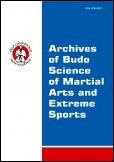2021, Volume 17, Issue 1
Selection criteria in identifying and developing the sporting talent of a football player
Jerzy Brzyski1, Tomasz Potejko2
1Paweł Włodkowic University College, Płock, Poland
2Stoczniowy Klub Sportowy Stoczniowiec Gdańsk, Gdańsk, Poland
Author for correspondence: Jerzy Brzyski; Paweł Włodkowic University College, Płock, Poland; email: jerzy.brzyski@onet.eu
Full text
Abstract
The term "talent" in football refers to a certain type of aptitude and innate motor as well as intellectual predisposition, which manifests itself in an above-average degree of physical fitness and the ability to quickly learn new motor activities (especially those related to the game of football). We propose to assess the quality of play (in a sense a quasi-test) on the basis of participation in so-called small games, e.g. 3 × 3 or 5 × 5 with goalkeepers in three competition groups, differing in the age of the competitors. The assessed player first takes part in a 3 × 20 minute "test game" competing against peers (e.g. born in 2007). During the second game, he confronts players born in 2006 and 2005, i.e. one and two years older. In the last game, the observed player participates with players (e.g. reserves of the first team of the respective league). We recommend a pitch size of 30 × 40 metres with a break of 5 minutes between games. In our opinion, an accurate determination of an adolescent player's current competence for the individual game can be helpful in developing their individual sporting talent in the future. It is a proposal open to substantive criticism. Thus, it can be supplemented or replaced by new indicators (methods and diagnostic tools) or even supplemented with new components.
Key words: agonology, encounter, individual player performance, praxeology





